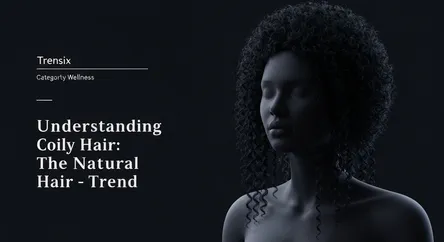Wellness
Understanding Coily Hair: The Natural Hair Trend

An explainer on coily hair, also known as Type 4. Learn about its unique characteristics and why embracing natural texture is a major beauty trend.
What is it?
Coily hair, classified as Type 4 hair, is characterized by its very tight curl or zig-zag pattern, starting directly from the scalp. This hair type is often fine and fragile, making it prone to dryness and breakage. This is because the natural oils produced by the scalp have a harder time traveling down the tightly coiled strands. Coily hair is further broken down into three subcategories: 4A, with S-shaped, springy coils; 4B, with a more Z-shaped, less defined pattern; and 4C, which has the tightest zig-zag pattern that may not be visible without stretching. Due to its delicate nature, coily hair requires significant moisture through deep conditioners, leave-in treatments, and oils to maintain its health and elasticity.
Why is it trending?
The rise in popularity of coily and other natural hair textures is largely driven by the natural hair movement. This movement encourages people, particularly those of African descent, to celebrate and embrace their afro-textured hair, rejecting Eurocentric beauty standards that favor straight hair. Originating in the 1960s and experiencing a major resurgence in the 2000s with the help of online communities, this trend is about more than just aesthetics. It represents a form of self-acceptance, cultural pride, and authenticity. This cultural shift has fueled a significant demand for specialized hair care products and has led to more representation of natural hairstyles in media and advertising.
How does it affect people?
Embracing coily hair has profound psychological and social impacts. On a personal level, it often leads to increased self-esteem, confidence, and a stronger sense of identity. However, it can also present challenges. People with natural hairstyles have historically faced discrimination in workplaces and schools, where such hair is sometimes deemed "unprofessional." This has led to activism and the creation of legislation like the CROWN Act, which seeks to prohibit race-based hair discrimination. Financially, while finding the right products can be a process of trial and error, many find that caring for their natural hair is ultimately more cost-effective than frequent chemical straightening treatments.